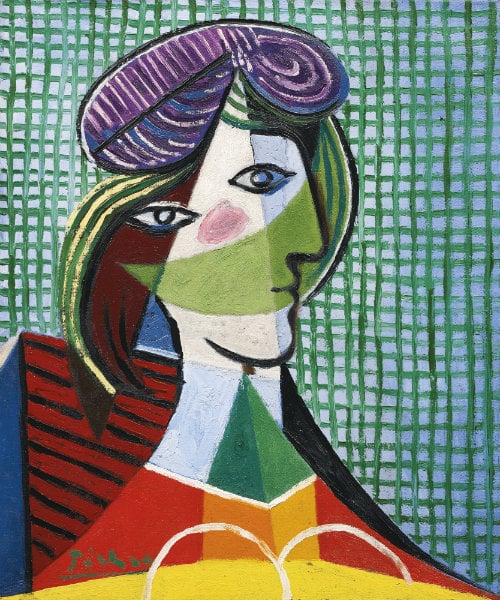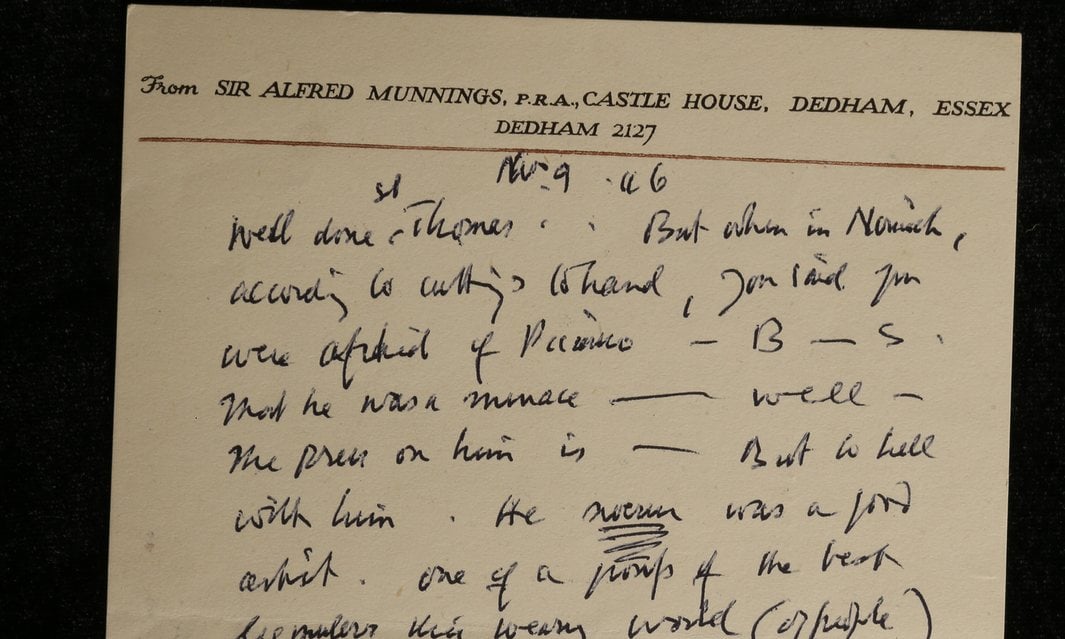Auctions
To Hell With Picasso, Who Was ‘Never a Good Artist,’ Said British Painter Alfred Munnings
Munnings was outspoken in his distaste for the Modernist master.

Munnings was outspoken in his distaste for the Modernist master.

Sarah Cascone

Add Pablo Picasso and Alfred Munnings to your list of famous art world feuds. The British painter, who made a name for himself on the strength of his traditional depictions of pastoral landscapes, horses, and sporting scenes, was an avowed critic of Modernism. Now, some of his unpublished letters slamming Picasso are about to hit the auction block, reports the Guardian.
London’s Chiswick Auctions, which is holding the upcoming September 28 sale, describes Munnings’s correspondence as “a fascinating collection of personal, witty but increasingly splenetic, letters by one of the greatest English figurative and sporting artists of the 20th century.” There is no indication Picasso ever responded to Munnings’s scathing remarks, so the feud likely remained one-sided.
“To hell with him. He never was a good artist,” wrote Munnings of Picasso to his Thomas Bodkin, director of the National Gallery of Ireland and founding director of the Barber Institute of Fine Arts in Birmingham.
In another missive to his friend, Munnings encourage Bodkin to buy some Dutch portraits. “I’ve never seen such perfection… Takes you back right into the past… when things were done well,” he wrote, noting they were “half the price of a blasted Piccasso! [sic] What is the world coming to?”

In this letter, Alfred Munnings slams Pablo Picasso. Courtesy of Chiswick Auctions.
Munnings wasn’t shy about airing his feelings in public either, and claimed that British prime minister Winston Churchill, himself an accomplished painter, shared his distaste for abstraction. In a 1949 speech at the Royal Academy of Arts, where he was the outgoing president, Munnings told the crowd that Churchill, who was present, supported his anti-Modernist views. The painter claimed that on a walk with the politician, Churchill asked him, “Alfred, if you met that Picasso coming down the street, would you join with me in kicking his something something?”
Churchill later wrote Munnings a letter denying the incident, saying, “I do not think we have ever walked up a street together, and anyhow this is not the sort of statement that should be attributed to me.”
Other reactions to the speech were mixed. Andrew Graham-Dixon’s A History of British Art claims the speech was a hit, and that “he became a popular cultural hero,” but slammed Munnings as “an inebriated reactionary of indifferent ability and waning powers.”
The Wall Street Journal’s Bruce Cole claimed that Munnings “erased himself from the pages of art history [with the speech], going from the pinnacle of the British art establishment to a cultural nonenity virtually overnight.”

Alfred Munnings, The Red Prince Mare (1920–21). Courtesy of Sotheby’s New York.
The Munnings letters included in the upcoming auction were written between 1931 and 1952, and are expected to fetch £2,000–3,000 (about $2,600–3,900).
According to the artnet Price Database, Munnings’s auction record for his paintings is $7.85 million, set at Sotheby’s New York in 2004 for The Red Prince Mare. His paintings have sold in excess of $1 million over 35 times.